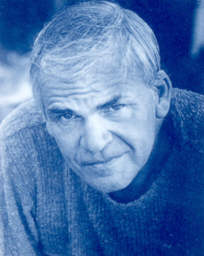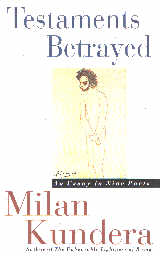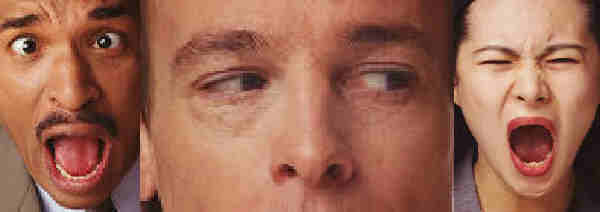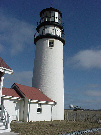To interpreters of the works of Rabelais, Kafka, Stravinsky, Hemingway, Nietzsche, and others, Kundera offers the following words of chastisement from Stravinsky, "But you're not in your own house, my dear fellow" (This phrase is also the title of the last chapter.) As a meta-critic of music and literature Kundera blows away the fog of confusion so that the reader may see how the well-meaning epigones, lost in the fog of cultural expectations, have strayed from the path laid out in the works of the original composers and authors.
In A Sentence Kundera presents three different translations of a Kafka sentence, followed by the original German, and finally an exact translation by Kundera. The foibles of translators are laid bare on Kundera's dissecting table. One must read translations with a fresh eye for literary foolishness after this chapter.
In Works and Spiders he quotes Nietzsche, "an act put on by system-makers: in their desire to fill in their system and
round off the horizon that encloses it, they must try to present their weak points in the same style as their strong points."
This filling in of the system, Kundera refers to as "a collaboration between an eagle and hundreds of heroic spiders
spinning webs to cover all the crannies."
In The Unloved Child of the Family Kundera says "Thus in the big family that is a small country, the artist is bound in multiple ways, by multiple cords." Someone from a small country such as Greece or Italy would be called a traitor for disparaging his homeland's character, but someone from a large country would be mostly ignored for the same offense.
In Paths in the Fog Kundera reminds us that man proceeds in the present always in a fog, unsure of what the next moment may bring. He says, "But when he looks back to judge people of the past, he sees no fog on their path," thus reminding us that when we judge the actions of others we should re-create their fog as a part of our creative act of imagination. If "all history is the history of thought" as R. G. Collingwood said, then the future history of thought, the evolution of consciousness from that time, must be a necessary part of the fog that accompanies us in our meditations on that time. This is the fog that Kundera lifts for us momentarily in this book, thereby betraying for all to see the many "Testaments Betrayed."
~~~~~~~~~~~~~~~~~~~~~~~~~~~~~~~~~~~~~~~~~~~~~~~~~~~~~~~~~~
 ~~~~~~~~~~~~~~~~~~~~~~~~~~~~~~~~~~~~~~~~~~~~~~~~~~~~~~
~~~~~~~~~~~~~~~~~~~~~~~~~~~~~~~~~~~~~~~~~~~~~~~~~~~~~~




